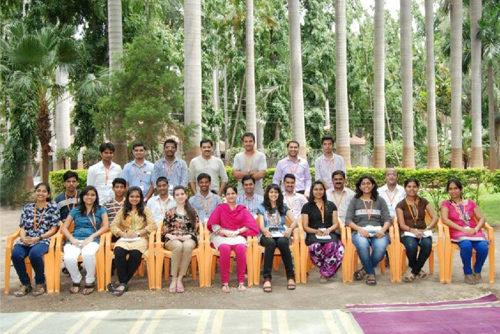
- Home
- Press Room
- Reports
- LMAD Baramati Youth Conference - 2013
LMAD Baramati Youth Conference - 2013
Baramati Youth Conference – August 15 - 18, 2013
The Let's Make A Difference team inaugurated its fourth conference on the India’s Independence Day, August 15th, 2013. More than 500 students from across colleges chose to participate, one of the largest gathering of students so far. The Let's Make A Difference Baramati team had, remarkably, reached out to more than 10000 students this year through all kinds of mediums. From this conference our aim is to inspire the young minds to build a good society and reduce their intellectual poverty. All the participants arrived at Shardanagar College at 11.00am to register for the conference, following which they gathered at the Auditorium on the grounds of Agricultural trust.
DAY 1
The inauguration began with the traditional lighting of the lamp by the panel of invited, honorable guests including Rajendra Pawar( chairman of Agri. trust, Baramati), Dr. Arun Adsul (Principal of Vidhya prathisthan),Rohit Pawar (CEO OF Baramati agro ltd company), Neel Prasad Chauhan (Tahsildar),Rahul Kalbhor (Block development officer), Sudhir Phongale (Writer), Geeta Castiliano (CEO of agricultural development trust, Baramati) & Saee Pawar. The anchor for the inauguration, Nikhil Gadge, introduced them to the audience. Karan Khalate, part of the core organising team and coordinator, welcomed all the participants and then introduced them to MRA-IofC and the Let's Make A Difference initiative. Karan also spoke about
the conferences that the Let's Make A Difference team had organized in the past both at Asia Plateau and other cities around the country and the impact of these conferences had had on the youth that participated.
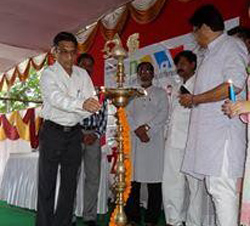
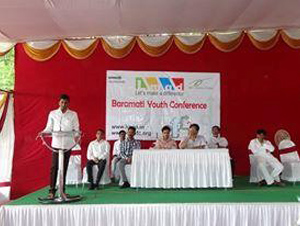
The invited guests addressed the student community. Mr. Neel Prasad Chauhan laid emphasis on the need to build a responsible society which will take ownership of key social issues and work with the government to bring about positive change. Mr Rahul Pawar spoke about the importance of nationalism and equality of all castes as imperative towards taking India to the next level of social and economic evolution. Dr. Arun Adsul motivated the participants to believe, that as the new generation, they had a crucial role to play in building this country’s future. He concluded his speech by showering great praise on the conference and its content. A past participant, Snehal, expressed her gratitude as thanks to the previous conference which she believed did wonders for her confidence.
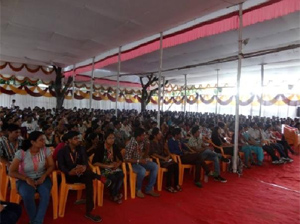
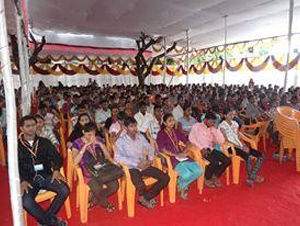
The participants were divided in eight groups and introduced each coordinator individually and laid out the conference rules. Coordinators play the most important role in the youth conference set up, there sacrifice and willing to walk the extra mile brings the best out of each enrolled participants. Each one of them comes with a special quality and together all becomes a big force to reckon with. Let’s make a difference youth regional conference is a gathering on the dais of change agents who want to pass on their learning with humility and humbleness. They cannot be introduced in words because they all are walking example and every passing moment will reveal their depth of IofC.
It was time for the groups to go to their assigned spots for their first group discussion where in each participant introduced her of himself to the group at large. This was a great ice breaker as every group became more familiar with each other and even though each group was fairly large, everyone was keen to participate. Each participant was given a diary, pen and badge which they were instructed to keep with them at all times during the conference.
DAY 2
Day two of the conference the essence of MRA and the concept of Quiet Time and the importance of listening to one’s inner voice and simply write and also sharing, on stage and in groups.Participants were introduced to Quiet Time and the four absolute standards of MRA–IofC Purity, Honesty, Unselfishness and Love, both, through an impassioned and very personal talk as well as a power point presentation. He spoke about the importance of waking up early in the morning and adhering to a disciplined routine. He gave the example of a species of bird that wakes up without fail at the wee hours of the morning and felt that the morning was the best time to practice quiet time and connect with one’s inner voice. The inner voice, he said, was the truest possible reflection of ourselves – of who we really are and that listening to our inner voice for the first time could be a shocking experience in so much as what we might find out about ourselves which is what makes this exercise of introspection all the more important. He said that we should aim to practice Quiet Time for at least 20 minutes every morning. Participants were asked how they saw their lives, 20 years from now based on the four absolute values of purity, honest, unselfishness and love. He then shared his first experience of observing Quiet Time and penning down his thoughts without hesitation and how truly shocked he was when he read it back.
He cautioned us to be conscious of our egos because that was the once personal vice that could prevent us from writing down who we truly were and our actions which we would never ordinarily share with anyone, not even our loved ones. Sharing childhood instances of when he stole chocolates in school and how during college years, he made his younger brother run errands for him. He said that he sadly saw that even the new generation was now vulnerable to its ego from a very early age. He cited an incident that occurred during one of his family occasions, when his 5 year old nephew Dev refused to say sorry to his grandmother for throwing pieces of snacks on her. He wondered that if little children had already developed a strong ego and couldn’t bring themselves to apologies to their elders, what of adults in their 30’s. He underlined the necessity to dispense with one’s ego in to order to be at peace with oneself and with everyone around – that life would be simpler without it and that if one person in the family was happy, then that feeling could touch the entire family just as a single candle can, eventually, light a thousand. He also spoke about how he and his wife and been an anchor for each other through this whole process of self realization.
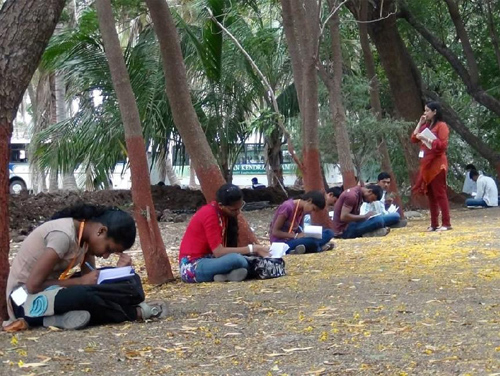
With that, all participants fanned out into the large, verdant property, to find their individual space for inner reflection. Many of them were seen writing several pages. After returning, several participants were eager to share their personal stories which reemerged in their memories during Quiet Time.
One participant shared about how over years, his love towards his parent had reduced and he had even stolen some of their money. He regretted having also indulged in eve teasing. Another participant stressed the importance of know who one truly is -- What is my identity? While the participant confessed that she wasn’t sure if she was ready to change but she was happy that he has at least found certain important answers during her first attempt at observing Quiet Time and saw that as a vital first step towards change. Another participant recalled a friend who called him an “onion” because his friend though him to have multiple personalities. He said he yearned to return to being his original self whom he has lost along the way while yet another participant said that while he had kept urging his brother to change, he had never thought about why and how he must change himself.
He explained the four absolute values with real life instances. With regard to honesty, he cited an instance when he encountered a policeman in Delhi who believed that he should remain true to his job even if he couldn’t get his fellow cops to do the same. For purity, he asked us to think deeply about what we say to our loved ones because as he recollected something his grandmother had once told him, that “words once spoken are like arrows released from a bow.”
However, if we spoke words of concern, kindness and love, then we could achieve anything. Purity of vision, he said, was also important, as some people had the tendency to be voyeurs as he discovered once outside a shopping complex in Delhi where a lot of men were staring at a scantily clad, female foreign traveler. He cautioned the youth against the dangers of viewing pornography which damaged purity of thought. To explain the absolute of love, he spoke about his unconditional love and recognition for his maid servant, Sakhu, who cares very much for him and works very hard at his house. We then collectively observed Quiet Time in our seats, eyes closed.
The post morning session was slotted for the Pyramid of life. He explained this very interesting concept using sand, marbles, golf ball in a glass container…..
A definite purpose in life, he said was extremely crucial and it was important to separate the elements of our lives that distract us from our goals from the ones that drive us towards them. Friends and family also played an essential role with regard to us finding or losing our way towards our set goals. He referred to the two remarkable speakers that the Let's Make A Difference team invited for the youth conference in Asia Plateau in June this year. There was Mr. Jadhav Peyang, a farmer in the North East who has single handedly created a wild life sanctuary spanning thousands of acres and a staggering diversity of wild life, all on his own. The wildlife reserve is now also home to a few Bengal tigers. There was also Ms Mittal Patel who, while she began her career as a journalist, eventually found her calling when she was appalled as how many nomadic Indian tribes were deprived of their rights as Indian citizens. She subsequently gave up her professional career to fight for their interests and get the state and central governments to recognize the members of nomadic tribes as citizens with rights. Viral Bhai said that both Mittal Patel and Jadhav Peyang had single mindedly worked towards their goals in spite of several obstacles and hardships and were both fine living examples of the Power of One. All participants followed instructions on how to articulate their personal and professional goals on a specifically designed sheet of paper, following which, we broke for lunch and then a group photograph before re- assembling in the auditorium for the post lunch session to be addressed by Pune based MRA seniors, Mr Bhanu Kale and Mrs. Varsha Kale.
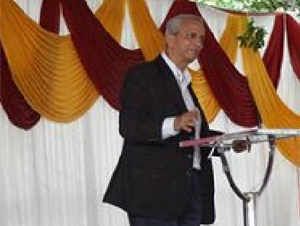
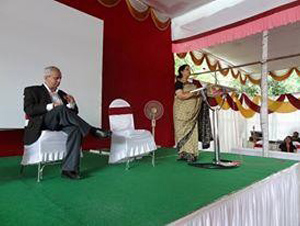
Mrunmayee Bhawkar coordinated the session by introducing Mr. Bhanu Kale, a veteran writer and editor by profession, edits a monthly magazine called “Antarnad” and has authored many books, having been associated with MRA for several decades now. Mr Kale began his speech by considerably lightening up everyone’s mood with a joke about how nowadays, improvised Marathi mixed up with Hindi and English is spoke more widely than the traditional style. The joke was about a Maharashtrian intellectual whose car breaks down on the highway and as the mechanic arrives, he explains the situation to him in pure Marathi. Not understanding most of what he said, the mechanic turns to the intellectual’s.
driver who tells him about the broken down car’s condition in short, throwing in a couple of English words. The mechanic then wonders why the intellectual can’t simply speak in Marathi.
Mr Kale then touched on a number of subjects relevant to today’s youth. He lamented how the tendency to be self-centered and corrupt can take hold of youth at a relatively early stage but at the same time praised the youth for having become technology savvy and how the positive, creative application of technology was helping put India on the path to development. He declared that “The New world begins with me”. Expanding on that statement and again alluding to the message about the Power Of One, Mr Kale said that we must believe in our abilities and strength to be the first to make a change before we ask others around us to do so. Why must we keep wondering about the state of relations between India & Pakistan when many of us aren’t entirely happy or sure about the state of our relationship with our family, friends and relatives? Change can happen from within you, he urged.
He gave the wonderful example of a successful entrepreneur who despite his tremendous success, remained simple at heart. Mr. Hanamanta Gaikwad, the founder and owner of a company called Bharat Vikas Trust, used to work at Tata Motors before starting his own company which specializes in cleaning services. Today, his company is responsible for maintaining facilities as prestigious as the Supreme Court of India and the Rashtrapati Bhavan .
Mr Kale stressed that Mr Gaikwad was able to achieve this level of success because of his simplicity and hard work and the respect he accorded to each of his employees whom he treated as family rather than hired labour.
Mrunmayee gracefully invited Mrs. Varsha Kale to express her thoughts to the gathering. She laid great emphasis on three words that she regarded as magical - Please, Sorry and Thank you. “Use these words to your dearest ones, you can touch there life by your good deeds, Mrs. Kale said. She narrated a touching story about how, once when getting off a bus, she smiled at the driver and said thank you. Later that day, she realized than she had left her handbag on the bus seat and when she returned to the bus stand to locate the bus, without much hope, the bus driver sought her out and handed her bag to her, saying that in almost 30 years of being a bus driver, she was the first passenger to acknowledge him. On another occasion, she has counseled and helped an old lady who wanted to end her life. The old lady changed her mind after she convinced her that there was a lot to live for. Mrs. Kale said that if we even put enough attention into doing the small things right, every small step we take will collectively make this country a better place to be. She asked us to take a vow that we will treat the world the way we treat our home. She shared another incident about when her daughter had ordered few books on a website and on delivery, the salesman billed her for less by mistake. Her daughter got in touch with him and gave him the balance money which indicates how children are strongly influenced by parental values. Mr. Bhanu kale then closed the session with a few stanzas of a beautiful Marathi poem, Kana.
The concept of a comprehensive survey that has been created, keeping in mind today’s youth and the challenges they faced in their daily lives as well as peer pressure. It covered everything from the youth’s habits pertaining to movies, shopping, the internet and role models were circulated among participants. The request was to be completely honest when filling out the survey as they didn’t have to fill in their names. This was an entirely anonymous survey and a similar one had been conducted by the Let's Make A Difference team during the youth conference at Asia Plateau, with striking results.
Discussion was initiated about personal development, citing a rampant bad habit amongst today’s youth of using bad language. In fact, he mentioned, even senior citizens were vulnerable to this habit to the extent that they sometimes didn’t even realized they were using cuss words. That and a multitude of other bad habits were eroding the time and energy of the youth, which he said, could be better channelized towards creative ideas and initiatives. Speaking with regard to his personal life, he makes a conscious effort to maintain himself physically with regular exercise and was also mindful about saving for his old age so that he and his wife would be entirely self-reliant at that point – something that the youth should aim for in their future. He said he had also had certain good hobbies which would fill his time positively during his old age.
One of the coordinators, Harsh spoke about the honest and courageous IAS officer, Durgashakti who stood up against the sand mafia in Uttar Pradesh and was sadly suspended by the state government for doing so. He further underlined the importance of creating a disciplined routine and sacrificing certain habits that take away our focus from our goals and identity. Harsh said that while it was important to have a purpose in life, the choice of that should be driven by one’s understanding of one’s self and one’s abilities rather than on the basis of what others believe one should do or the qualities one should have. Once one has made that honest and at time, unpopular decision, it’s then time to start taking steps towards imbibing the chosen cause or profession.
Participants were shown a very powerful video regarding the plight of the girl child in India. The rampant practice of female infanticide, in many cities and villages across the country, even today, the girl child is killed at birth, sometime drowned in a bucket of milk. A related story about a girl participant and her sister whom he’d met during last year’s conference. The two sisters were staying in a hostel because their mother didn’t want them to stay with her because they were girl child. Everyone was quite shocked to hear this. Everyone present in the auditorium need to take a firm resolution against dowry. “Don’t take or give Dowry,” Karan frankly shared that sadly many educated men in Baramati and around still believed in taking dowry and a lot of awareness was needed against this ancient Indian cultural evil that even many youth these days, believe in.
Geeta Castiliano also addressed participants on the subject, saying that none of the participants, especially the girls, should not be afraid to take a stand, even if it is against the will of their parents and society at large if they want to study further and not be married at a young age. They must reason with their parents and assert their rights. you want to study & don’t want to get marry then argue with them, convince them. Everyone signed a pledge to do so. Harsh added that if young students much like the participants, focus their energies and priorities on getting a good degree and a successful career, then the society would be compelled to take them seriously and accord them the respect of an equal adult. He shared an incident where in a particular slum, the children wanted their parents to change their approach to certain aspects of life and could only really convince them by setting an example themselves. The session was followed by a group discussion on the subject of marriage and dowry and how girls had borne the brunt of this terrible practice. There were frank and serious discussions and a re-affirmation of the commitment to stamp this evil out of our society once and for all.
DAY 3
The penultimate day started with a exercise compares ourselves to a jar containing our different character traits, habits, weaknesses, strengths and relationships with family and friends. Narrated examples showing that how difficult it is bring change in life. Speaking about his relationship with his mother, father, elder and younger brother as well as a close friend. Many stories were shared and examples were given which moved the participants and taking them to a deeper level of thinking towards realization.
The participants then proceeded for quiet time and sharing with their groups. There was a lot of emotional outpouring among all of the groups, indicating that they had been very touched by the morning session and in some way or the other related deeply to what was shared. One participant said she will, from now on, strive to be completely honest with her family while another said she now realized the important of providing love and care to her grandmother and not just material things.
One participant said that she used to give more important to her father than her mother but realized during today’s quiet time session that her mother had sacrificed so much for her and that she deserved as much love and attention from her as her father did. One boy said he felt terribly ashamed to have gone to
see a movie while his parents were admitted in hospital in serious conditions and lied to them about it, saying he was going to class. Sadly they died and he continues to regret what he did. He said he deeply loved them.
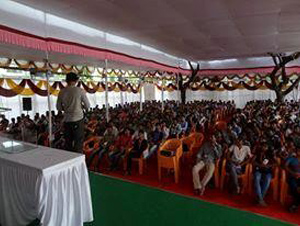
Family Session which is an extended intense session where participants, if they chose to, could come up on stage to talk about relationships they share with their family and friends. Viral Bhai began by sharing about the episode during which his mother was hospitalized and how he was there by his mother’s side as she recovered. Soon, a few participants came forward to share. One participant spoke about how her sister who had been in coma for some time, was able to recover, thanks mostly to her mother’s faith that she would recover. Another girl spoke about her relationship with her step mother – that she did not love her or care for her and that she missed her mother. We then broke for tea in silence and on returning, the concept of Aahuti, was explained where in each participant wrote down one of their negative character traits or habits on a chit and then went
group wise to a bonfire outside, threw the chit in and then held hands and prayed together. We then had a letter writing session where in participants were asked to write letters to themselves which they could expect to be posted to their homes anytime within the next 9 to 10 months.
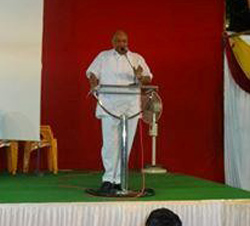
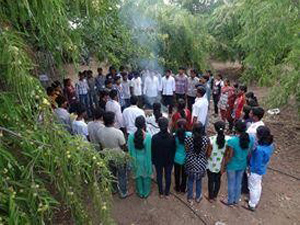
The next sessions, began explaining the ‘I’ exercise to participants – here participants were given single sheets of paper with a large circle with an ‘I’ at the centre and they had to introspect and mark down dots with names of people whom they had drifted away from. However, before the exercise could be conducted, everyone was pleasantly surprised by Mr. Sharad Pawar (Agricultural minister of India) who decided to pay a visit, accompanied by his son-in-law, Sadananda Sule and addressed the excited participants and fielded several of their questions. We continued and completed the ‘I’ exercise following Mr Pawar’s departure.
DAY 4
The conference’s final day began with a multi-faith prayers where many of the participants praised the lord and the room was filled with positive energy that set the tone for the day. Doubts always creep in pertaining to quiet time and inner listening, difficult to make a first timer understand the speaking still voice within and the difference between thoughts that come to us usually. Regular practice is the eye to listening and believing to have courage to follow the thought with patience. Many years ago, one morning while sitting in the balcony of Mountain house, he observed that there were no young Indians at the Caux centre and a thought crossed within why not inspire young people to come to Caux. He shared this with some of the MRA youth when he returned and the response was fairly positive. One of the youth, Jui Gargate, was keen too but due to certain circumstances had to decline. Yet, Viral Bhai, believed she could make it, right until two days ago and when a positive turn of events and sheer belief eventually led to Jui being part of the group and soon, sitting on the same balcony, Viral Bhai saw 15 young Indians at the very centre where, earlier, there were none.
He also took the participants through an in-depth power point presentation on how the inner voice, ego and mind are active during Quiet Time and how it is up to the individual and his or her resolve to let the inner voice guide the mind rather than the ego. The process of Connection, Correction and Direction (CCD) in that order is something he urged the participants to reflect on where in the inner voice would connect with the mind, ignoring the ego, making that correction in one’s life, be it apologizing to someone they had hurt or ridding themselves of any vice they might be addicted to and then set on towards success. Soothing sounds of the flowing water mesmerized the students helping them connect deep within themselves in meditation to search the real ‘I’.
The floor was open for the participants to express themselves about their thoughts and commitments they might have made as a result of attending the conference. There was a great diversity of response ranging from how they had come to realize and appreciate their own lives because others have had it so difficult and how many of them had come to realize their mistakes and were determined to make amends. Some were also more focused now, having gone through the golf ball and ‘I’ exercise. One participant also shared a beautiful Marathi poem that the participant had composed in the course of the conference while another said he had touched his parents’ feet and apologized to them for everything he had done wrong, inspired purely by the family session. Another boy confessed to having wiped his show with a piece of paper that had a group name ‘Governance’ on it and apologized to the group and has punished himself by skipping breakfast. One of the girls said she felt very blessed and happy and that she had learnt a lot from everything the organizing team had shared on stage.
.jpg)
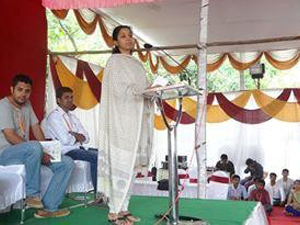
Like last evening, everyone was surprised with yet another famous visit, this time by Mrs. Supriya Sule (Member of Parliament). Bhisham introduced Mrs. Supriya Sule one stage, inviting her to address participants on how they could best engage the political system. Mrs. Sule said she has learnt a lot of things from students and saw them as a great inspiration, underlining the importance of self- realization in order to succeed in the long term. Education and culture, she believed, were two important aspects of one’s life at any age and she paid tribute to MRA-IofC for instilling these and more core values in the participants, not least of which was the banning of cell phones and cameras during the conference. She also noted and appreciated gender equality at the conference as boys and girls were seated together rather than in separate groups. When answering some of
the questions from the audience, she stressed that it was important to be original and to be oneself rather than simply ‘posturing’, saying “Let’s make lifelong and have fun”. She also felt it was more important to spend quality time with the family rather than a large quantity.
In response to Harsh’s question about whether ethics could be part of politics, she said that ethics were a relative concept and to each their own. She also urged participants to exercise their fundamental right to vote in the state and general elections next year. She then asked the participants what had they learnt from the conference and felt as it was drawing to a close. The responses were varied -- gender equality, the importance of moral values and a boost in self confidence. The sharing continued after Mrs. Sule left. One girl remarked that “one beautiful thought is important than 1000 beautiful faces”. Another girl who had attended the conference last year and had been observing Quiet Time since, felt she had been able to achieve a lasting change. One boy spoke about how bad he felt when some boys were shouting when the girls were going towards their hostel, even though they had signed a pledge to respect women. Another boy said, the search for the answer to “who am I?” is something he will still continue to pursue.
Participants were also given feedback forms, allowing to frankly express how they felt about the way the conference had been conducted as well as volunteer for MRA-IofC causes in the future. Harsh then took them through a power point presentation of the results of the survey that the coordinating team had tirelessly worked through for two nights consecutively to arrive at. Some of the parents and teachers, invited for the final session, also got a chance to share their thoughts. One teacher said that the youth conference had very directly and positively influenced the behavior of participants while one father received a hug from his daughter, who simply said, “I love you dad”. In conclusion, Karan thanked the Baramati organizing team and said it was now the responsibility of every participant to embrace the message of Let's Make A Difference in their everyday life . Viral Bhai recognized each of the coordinators, presenting them with certificates and coordinator group photos. We all rose to observe the national anthem after which, coordinators awarded each of their group members with certificates and group photos. Then, as the conference finally concluded, participants mingled with coordinators, thanking them and making friends, as yet another Let's Make A Difference initiative had positively ignited more young minds and created the change agents for a forthcoming generation.
